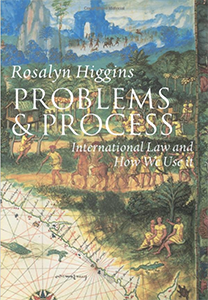
Problems and Process; International Law and How We Use It
International LawLJ HowardBy Rosalyn Higgins (Clarendon Press; Reprint edition (November 9, 1995))
Reviewed By LJ Howard, 29 June, 2021
Rosalyn Higgins was the first woman to be elected to the International Court of Justice (ICJ) (12 July 1995) and concluded her time there as the Court’s President (2006-2009). Previously, she had served as a specialist researching international law at the British thinktank, Chatham House [The Royal Institute of International Affairs], taught at the London School of Economics, and served (1980-1995) on the UN Committee for Human Rights, “the body of independent experts that monitors implementation of the International Covenant on Civil and Political Rights.” Her background in policy, practice and scholarship and as a jurist qualifies her 1994 book, Problems and Process; International Law and How We Use, as well-researched literature that is balanced in terms of law and its subject matter. Her ability to write eloquent and persuasive prose makes the book an’ easy read,’ and arguably one of the earlier ‘should-reads’ for those who wish to become and remain current with the multi-disciplinary character of geo-politico-legal discourse.
The book itself introduces the essentials of international law but is not a recital of law. Its fifteen short chapters – most under twenty pages – hits themes that explain underlying law while simultaneously informing broader contemporary (2021) issues arising in socio-political and securiity fora. The first five chapters sum up what a foundational course in international law will cover – the nature and function of law and its sources, the larger international legal system, followed by competence and jurisdiction, and lastly, immunities. With these five basic concepts in hand, every reader will better digest and respond to the essentials of many applications of international law.
The remaining ten chapters assesses how international law impacts the political and other dynamics of e.g., human rights, the right of a people to self-determination and natural resources. The book incisively assesses the law of responsibility of states for internationally wrongful acts, a set of rules subsequently and finally set out in articles produced in 2001 by the International Law Commission under the rapporteur-ship of James Crawford, who serves as a Judge ad hoc on the ICJ. Further, the book’s subject matter embraces the role of law at the premier international organization, the United Nations, including the UN’s problematic use of force under Chapter VII of the UN Charter in peacekeeping operations. Beyond diagnosing largely practical issues, the book devotes one chapter to a short survey of matters that deal more with legal philosophy, such as equity and proportionality in judicial decision-making in e.g., maritime disputes, armed conflict, and human rights. Coincidently, Higgins was a member of the Court during the controversial 1996 outcome of the Legality of the Threat or Use of Nuclear Weapons Advisory Opinion requested by the UN General Assembly, wherein the Court was unable to fulfill its judicial function of arriving at a decision, leading to a rare non liquet or ‘non-finding.’
In sum, one more efficiently reads the book in short one-chapter segments, as each chapter is a stand-alone product. When taken all together, the reader will have acquired a good introductory command of international law.
Rosalyn Higgins, Problems and Process; International Law and How We Use It (Oxford 1994) 274 pp, is available on Amazon.
